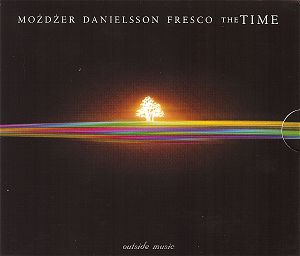Asta
Incognitor
Sortorello
Tsunami
The Time
Asta II
Easy Money
Smells Like Teen Spirit
Svantetic
Suffering
Trip To Bexbach
Asta III
Suffering (Bonus Track)
Released in 2005, The
Time received a double-platinum award
for selling more than 20.000 copies within
two month of being released. So, if you don’t
already own this album, my first question
has to be, why not?
I first came across Leszek
Możdżer and Lars Danielsson
on their excellent duo album Pasodoble,
and many of the qualities on that album are
equalled and surpassed on The Time,
due in part to the addition of the sensitive
and musically enthralling contribution of
percussionist Zohar Fresco. The creative drive
behind many of the compositions on this album
is down to either Możdżer
of Danielsson, but the sense of collective
musicianship means that the character of each
piece is very much dictated by a unity of
sound and equality of contribution which rises
above the common jazz tradition of composed
hook, followed by a row of more or less tediously
ego-trip solos.
There are a number of highlights
for me on this disc, but the main attraction
for me is in fact the thematic ‘ritornello’
quality between many of the tracks, anchored
by the Asta series – each being a kind
of variation around a certain kind of harmonic
nuance, while at the same time possessing
plenty of individual character and contrast.
The opening of the first Asta has some
of that open-landscape feel, with Danielsson’s
bass sounding like the song of a whale, and
Możdżer’s
piano the sparkling waves above. The soulful
main theme, sung in the distance by Fresco,
sums up the feel of the album – restrained
and lyrical, and like much good music possessing
melancholy and a spirit of underlying joy
at the same time. This is reinforced by the
majestic Incognator, which mirrors
the descending bass of the previous track
with a gorgeous rising progression.
A change of pace kicks in
with the folk-like Sortorello, which
fuses a medieval dance with the trio’s unique
idiom: providing the musicians with a vehicle
for some more improvisatory playing. With
Tsunami we arrive at another track
which has me groping for superlatives. Monumental
and disturbing in its simple, sometimes chorale-like
lines, I can imagine this expressing all kinds
of things to all kinds of people. The relatively
brief title track The Time is another
confluence of shade and subtlety, drawing
lines of music together like the laces of
your favourite old shoes – the ones which
fit perfectly, and which you never want to
throw out.
After a reprise and development
of the opening track in Asta II in
which Danielsson performs some expressive
pizzicato on the cello, we have another swinging
track in Easy Money, in which the colourful
instrumentation and lightness of touch of
Zohar Fresco’s percussion plays an important
role. Kurt Cobain’s Smells Like Teen Spirit
might seem like a unusual number to include
here, but the arrangement suits this trio
like a hand in a glove, the simplicity of
the central progression being richly transformed
and providing a rolling groove for some refined
improvisation. Even when this trio is improvising
it somehow sounds composed – by which I don’t
mean contrived or restricted – it’s just the
way they do things: highly controlled, detailed,
meticulously measured and prepared, but going
beyond extravagant technical fireworks and
exploring more deeply into real music making.
This is also true of Krzysztof Komeda’s Svantetic,
the trio paying tribute to this legend of
Polish jazz with a reasonably straight rendition
of what should be more of a classic number
outside Poland.
Suffering subdues
the piano with damped strings, overdubbing
Danielsson’s cello with simultaneous pizzicato
and bowed notes. Fresco’s percussion has an
ethnic colour in this music, but no member
of his battery of exotic instruments is allowed
to become an overbearing feature of this music.
Like all good percussionists, he knows the
value of stable but interesting rhythm, picking
out character in the music through the variety
of accents and touches on his simple but beautifully
constructed hand-held drum. The final notes
of Suffering run straight into the
freely improvised opening to Trip to Bexach,
which soon becomes an infectious, dancing
number in which the left hand of Możdżer’s
piano is damped, most of the melody allowed
to sing free to magical effect. The final
Asta III initially turns the piano
into an autoharp – I do love Możdżer’s
creativity with the piano. Danielsson is again
on cello here, and Fresco adds fresh-air sparkle
with light cymbal touches, bringing the album
full-circle with a sung conclusion. The added
bonus version of Suffering, a sort
of fun out-take, is like the encore
to a live concert – something which one can
take or leave, but is something of an indulgence
on what is otherwise an immaculately turned
record.
With demonstration - analogue,
the label is marked AAD - sound quality and
superb design and presentation, this is a
must-have for any lovers of good music – whatever
he genre. Have a look at the beautiful Outside
Music website and listen to a few of the
sound samples if you need any further convincing.
Dominy Clements
